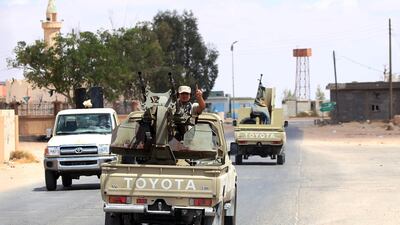Hundreds of protesters angry about corruption and the lack of public services in Libya were scattered by gunfire on Sunday in Tripoli.
The Interior Ministry of the Government of National Accord in Tripoli blamed rogue elements for trying to stir discontent and vowed to arrest those responsible.
Most of the capital’s powerful militia groups are affiliated with the ministry.
The UN special mission to Libya called for an immediate investigation "into the excessive use of force by pro-GNA security personnel".
Demonstrators were incensed by electricity cuts and water shortages at a time when Covid-19 has slowly spread through a country with limited medical resources, despite social distancing measures.
They marched to the headquarters of the GNA and then to Martyrs' Square where they were fired at.
Some carried white flags in an apparent sign of their lack of support for all factions in Libya.
The area was later closed off amid heavy security with the ministry saying one person was injured.
Days ago, the GNA and the head of the eastern-based Parliament announced separately that hostilities would end and nationwide elections would be sought.
GNA Prime Minister Fayez Al Sarraj called for the demilitarisation of the central coastal city of Sirte and the Jufra region to the south.
Both are highly contentious areas that give access to a large chunk of Libya’s oil network.
But forces loyal to Field Marshal Khalifa Haftar, whose power base is in the east of country, accused the GNA of deception.
"The initiative that Sarraj signed is for media marketing," said Maj Gen Ahmed Al Mismari, spokesman for the Libyan National Army.
"There is a military build-up and the transfer of equipment to target our forces in Sirte.
"If Sarraj wanted a ceasefire, he would have drawn his forces back, not advanced towards our units in Sirte."
Field Marshal Haftar’s forces control Sirte after capturing it in January from a rival faction nominally allied to the GNA.
Meanwhile the International Committee of the Red Cross said that Covid-19 cases in Libya increased more than 15-fold since June, with more than 500,000 people in need of healthcare assistance.
Red Cross president Peter Maurer, who visited Tripoli and the city of Benghazi in the east last week, said the conflicts of the past decade had left the country damaged and civilians bearing the brunt.
"Neighbourhoods on the former front lines in Tripoli are badly scarred and families have little if anything to return to," Mr Maurer said.
"People are also at risk of being killed or injured by dangerous, unexploded munitions.
“At the same time, infrastructure all over the country is falling apart.
"People have little electricity, drinking water, sanitation or medical care in the middle of a growing pandemic."


